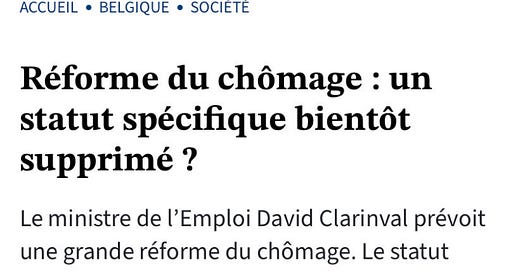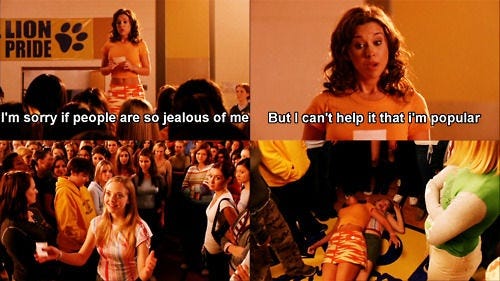First, a little context
(Please note that these are rough lines)
What is the worker of the arts status, anyway?
In general lines, it’s a special regime within the general unemployment benefits system in Belgium. It applies to resident workers who can prove their contribution essential to technical-artistic cultural production in the country, within specific criteria. Just like for the general unemployment regimen, to access these benefits one must prove a minimum revenue within a certain period. Most of it (2/3) must be artistic, but to account for both the intermittent nature of employment for most workers in the cultural field, and the significant associated load of “invisible labour”, the requirements are lower than for general workers. Another main difference is that benefits under this regimen do not decrease over time. It is renewable -per the latest reform- every three years, if the worker has attained a minimum threshold of work days within that period.
In practice, it’s somewhat close to a basic income.
What is changing?
On 31st of January 2025, a final coalition agreement was reached among a majority of the parties that came ahead in the last Belgian Federal election (234 days prior, welcome to Belgium).
On the same day, the government (referred to as “Arizona government) that resulted came forward with a number of proposed new reforms. For the sake of this specific post, I’ll focus on the austerity reforms affecting workers (but let it be known that the whole thing is a disgraceful shirtshow, notably regarding migrant and asylum rights).
Regarding unemployment benefits, the reforms propose a limit in time to 2 continuous years of benefits max, as well as the removal of the ban on work on Sundays, and the modification to what constitutes “night work”. Access conditions to full pensions are also proposed to be modified, in a way that penalizes interrupted full time work (typically affecting mothers, and certain types of disabled people) over the course of a lifetime.
“More money for those who work”, they said.
And then?
Worker of the arts status was spared by the first government agreement. However, on the 26th of March, Federal Minister of Employment David Clarinval brought up the possibility of ending the worker of the arts status.
2020 data estimated Belgian cultural workers at 80,000 (and the whole cultural sector, administrative and technical jobs included, at 200,000). In April 2024, the estimated total number of people on full employment benefits in the country (minus cultural workers, then 7515) was 269 531 people, out of a 11,763,650 population (by 2024 data).
Workers with worker of the arts status are therefore about 10% of the artistic cultural workers, 2,9% of those receiving unemployment benefits, and 0,07% of the Belgian population. A minority within a minority, however you look at it. That’s statistically, and politically, pretty insignificant.
It’s important to note that to be considered as a worker (rather than “independent” or “entrepreneur”) as a freelancer in the arts in Belgium, one must often pass by a third party system in which a structure will act as an intermediary between yourself, and whomever wants to buy your art or arty services. Said structure will be, for all legal purposes, your employer.
The system has many advantages (like the possibility of the Holy Grail that is the worker of the arts status), but comes at the cost of the fee you negotiated for your art to be taxed twice (employer taxes + income taxes), on top of the intermediary structure’s commission fee. So, out of every 100€ whomever buys your art or services pays, you’ll end up seeing about half on your account.
This means you’ll have to invoice a hella lot of money to reach the Belgian median salary of 3.728€ (before income taxes). Long story short, worker of the arts status is often the only way to be a full-time cultural freelancer without a survival side hustle.
Those of us who have the status, we know what it is to know that, even through the roughest patch, we won’t starve. This simple fact is powerful negotiating leverage that allows us to escape the direst and most exploitative work conditions, those many of us previously had to accept. It cushions much of the immense invisible labour behind artistic work.
Maybe most controversially, but probably more importantly, it allows you to do other things than only grind, to take greater artistic risks because not everything has to be a profitable success right away. It makes space for reflection, research, unwinding and leisure.
What is more precious, in these capitalistic times, than to remember that there is more to life than capital?
I’ve been, officially, a cultural worker in Belgium for close to 10 years. Of those years, only in the past 2 I’ve had worker of the arts status. Worker of the arts status has changed my life, my work, and my career. I am a convert, but perhaps not in the way you might imagine.
Personally, I don’t think “culture” is automatically good, in the sense we often like to argue to defend our own work and social value. Culture, I’d argue, is neutral. It’s just a fact of humanity. Cultural products reproduce and reflect cultural values, but also shape them. As we’ve seen in many ethno-nationalist, fascist regimes, they can be used to promote and enforce repressive, simplistic narratives of national identity.
At the end of the day, I think cultural workers should be loud now, not because our specific privileges are now directly threatened, but because the life worker of the arts status allows a vision of life worth defending for all.
Anti-capitalist idealism aside, I’d also like to argue that even in the most selfish sense, defending our own exceptionalism as cultural workers -or, you know, artistes- is a very weak political strategy that can turn on us at any moment. Not only are we an easily politically expendable nano-minority, but as long as this kind of support remains accessible to only a minority upon changing access criteria, it will remain unreliable at best, and vulnerable to political weaponization and scapegoating.
It also makes us look like self-aggrandizing spoiled brats who can’t read the room.
Is artistic work specific? Yes. Like many other forms of labour. I am an acrobat, subjecting my body to a level of physical performance that is, if you’re lucky, sustainable into your mid 40s, and that will leave a heavy toll on my body. I can’t do what I do for 8 hours a day until my late sixties. Neither can other workers who have physically and emotionally taxing jobs. Furthermore, a system that sees people as first and foremost workers will directly harm anyone who can’t bend to the demands of the job market.
We deserve better than to grind ourselves to the bone, in the hopes that by age 67 we are in good enough health to enjoy what’s left ahead. We deserve better than to finance endless increases in military spending and violence at our borders and beyond, particularly at the cost of our wellbeing, our health, our personal lives, our growth, our communities, our lives. We deserve better than being reduced to our capacity for profit-generating labour.
All of us.
My dear fellow cultural worker, if you made it here, thank you. What I hope to bring across with this is a pledge to see ourselves simultaneously as workers rather than artistes, and humans rather than workers.
Workers, in terms of labour rights, of a collectivity in solidarity and continuity with everyone else in the struggle to defend their right to dignity and wellbeing above the demands for productivity. Humans, and members of larger networks and communities of people that make up and shape our territories, as creatures of connection and meaning first and foremost.
The new government got itself elected by throwing fuel into in-and-out-group differences and built resentment, feeding into our feelings of injustice and entitlement. The proposed reforms will be a juggernaut against welfare, social services and equalizing structures if we let them happen. We’re on for a few years of resistance against them, and for it to be effective, we urgently need to overcome our sense of singularity and separateness from others.
We, worker of the arts-legitimized workers, are not that special, and that is the point.





